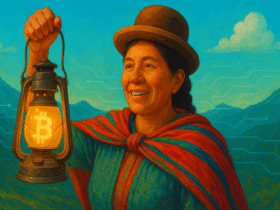Key facts:
The main challenge will be to make renminbi available to oil-importing countries.
The introduction of the petroyuan will increase the fragmentation of the global financial system.
As part of the BRICS’ de-dollarization plan, the group of countries led by Russia and China is also evaluating new payment alternatives for global oil trade.
The idea is replace the current petrodollar-based system and use the petroyuan. As noted in an article by Herbert Poenisch, a senior researcher at Zhejiang University, the inclusion of the Chinese currency will be part of the agenda which will be discussed at the BRICS summit, taking place from 22 to 24 October in Kazan, Russia.
The article by Poenisch, who was a senior economist at the Bank for International Settlements (BIS), was published by the Official Monetary and Financial Institutions Forum (OMFIF), an independent body that brings together central bankers from around the world.
The document highlights the changes that have taken place since the last BRICS summit in South Africa last year. Among them is the addition to the group – initially made up of Brazil, Russia, India, China and South Africa – of members such as the United Arab Emirates, Iran, Egypt and Ethiopia. along with Saudi Arabia, (the world’s leading oil supplier).
The incorporation of this significant group of oil-producing countries underpins recent efforts to de-dollarization extends to global oil trade.
“Russia, a country at war with Ukraine and engaged in an economic conflict against the entire Western alliance, will use the summit as a means to pressure BRICS members to join this effort,” Poenisch said.

He also points out that the Eurasian giant does not only want the petroyuan to be used for oil trade. It also wants the mBridge payment system is usedin which some BRICS countries participate together with the BIS.
In addition, there is the common currency backed by gold that the regional bloc has been developing for a few months, and which is known as UNIT. All this, with the purpose of reduce dependence on the dollar.
It will not be easy to incorporate the petroyuan
However, the plan to use the petroyuan will have to face some challengesPoenisch cites the difficulties in meeting all the requirements of a currency: denomination, means of payment and store of value.
The main challenge for the petroyuan will be to make enough renminbi available to major oil-importing countries, such as India. Since they do not have current account surpluses with China, these countries do not earn enough renminbi to pay for their oil imports. They must be provided with renminbi through other channels.
Herbert Poenisch.
At this point, the expert believes that mBridge could offer a better solution. The project led by the BIS, which has reportedly already reached the real-value testing phase, is based on the interaction of central bank digital currencies (CBDC).
In this way, it allows immediate settlement between associated central banks in China, Hong Kong, the United Arab Emirates, Thailand and now Saudi Arabia. Additionally, transactions carried out on this platform avoid scrutiny from third parties like Swift and the US.
In his analysis, Poenisch explains that if the BRICS include the petroyuan, there will also be countries that will earn massive amounts of renminbi. Consequently, a mechanism will be needed to recycle surplusesIn the dollar-based system, this is managed by global banks.
«In the case of the petroyuan this process will be difficult, and BRICS financial intermediaries will be faced with the task of recycling the surpluses to countries in need, which will be a test, since China tightly controls the market. offshore of the renminbi,” the economist notes.
However, the BRICS They seem determined to face the challenges and have been persistent in their goal of designing a variety of new means of payment without using dollars.
We must also consider the efforts that China is making. to increase the use of the yuanor renminbi, in global transactions. As CriptoNoticias has reported, since last year China and Saudi Arabia have been part of the Shanghai Cooperation Organization (SCO), a political, security and commercial alliance that aims to take the spotlight away from the dollar at an international level.
Added to this is the Saudi authorities’ strong willingness to trade oil in currencies other than the dollar.
In any case, it is a process that is in full swing, and that will probably take a good while to unfold. Although in this context of progressive and slow de-dollarization, the introduction of a petroyuan would contribute to increasing the fragmentation of the global financial system.






Leave a Reply